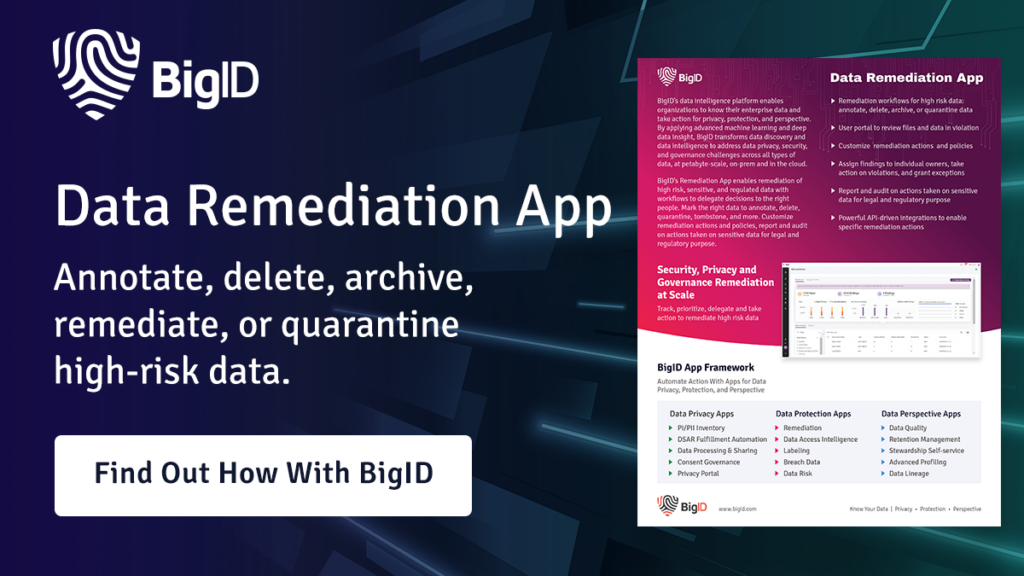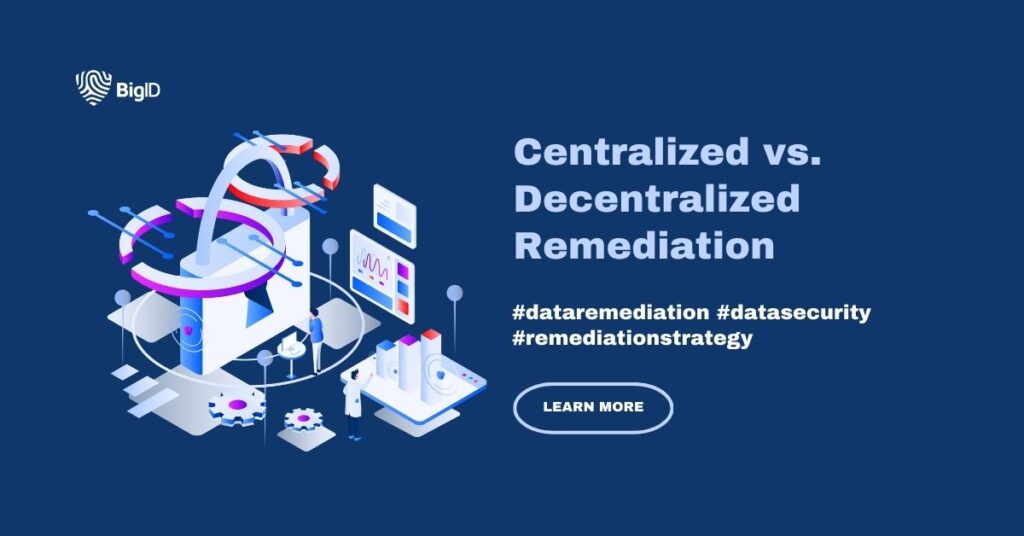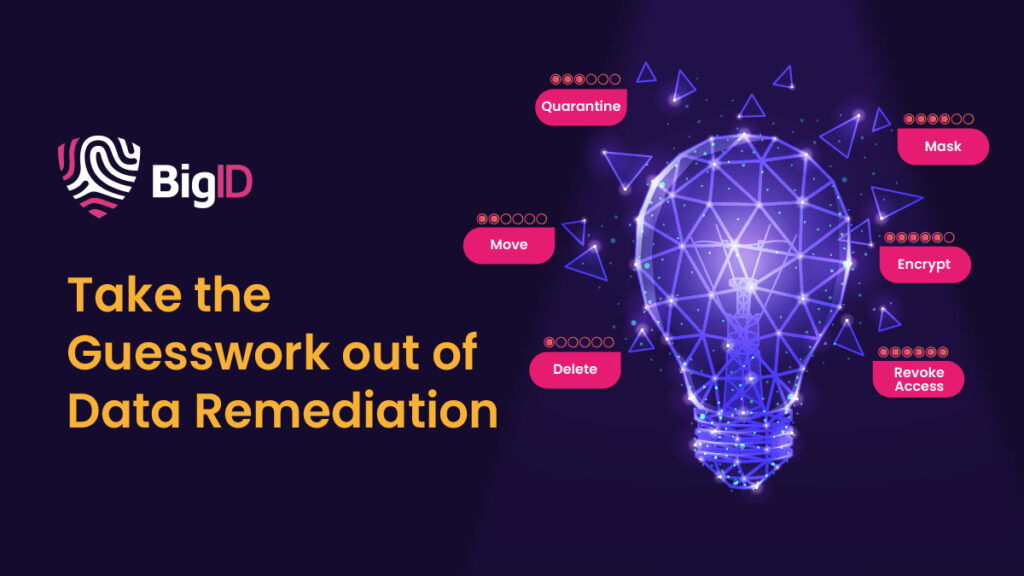When it comes to data security controls – whether you’re talking data security posture management (DSPM), data security platforms (DSP) or even cloud data loss prevention (DLP) – , the method of remediation can significantly impact both efficiency and effectiveness. Broadly, there are two main approaches: a centralized remediation model, typically overseen by a Security Operations Center (SOC), and a decentralized remediation approach where data owners are responsible for addressing security risks. Understanding the nuances between these methods is crucial for organizations looking to scale data protection efforts.
At the heart of these two methods is the question of ownership: should data risk remediation be the responsibility of a centralized SOC, or should it fall to the individual data owners who manage and control the data? Each method has its strengths and weaknesses, and understanding these distinctions can guide the selection of an appropriate strategy.
The Centralized SOC Approach
Most Chief Information Security Officers (CISOs) and security professionals are accustomed to a SOC-centered model for remediation. In this setup, security analysts within the SOC monitor for incidents, such as discovering high-risk data in an S3 bucket. Once detected, they create tickets through systems like Jira or ServiceNow, which are then assigned to other SOC personnel to investigate and resolve.
The advantage of this approach is clear: it keeps all activities within the SOC, making it easier to track and manage remediation efforts. BigID, like other DSPM solutions, supports this SOC-driven model with case management features, integrating seamlessly with Jira and SOAR platforms. However, despite its familiarity and ease of tracking, the centralized approach has significant limitations—particularly in terms of scalability.
As data expands across databases, cloud storage, emails, chats, and other repositories, the volume of incidents can quickly overwhelm a centralized SOC. Handling thousands, or even millions, of potential incidents becomes impractical. Furthermore, other DSPM solutions often lack the ability to pinpoint the exact finding or its location, leaving SOC analysts to search through countless files and folders without the necessary context. In many cases, SOC analysts are tasked with remediating data they do not own or have direct access to, which only complicates the issue.
This model may work well for incidents involving localized data, such as those related to Data Loss Prevention (DLP) or Endpoint Detection and Response (EDR), where security teams have direct control. But when it comes to dispersed data across multiple systems, a centralized SOC model becomes a bottleneck, hindering timely and effective remediation.

BigID’s Decentralized Delegated Remediation Approach
Recognizing the limitations of the SOC-based model, BigID developed the Delegated Remediation approach—a decentralized solution that places responsibility in the hands of the data owners. Rather than relying solely on the SOC, BigID’s system pushes the responsibility for reviewing and remediating incidents to the individuals or teams who manage the data itself.
This decentralized model offers several key advantages. First, it eliminates the bottleneck created by centralizing remediation within the SOC. By delegating responsibilities to data owners, organizations can scale their remediation efforts across a far broader range of assets without overwhelming a single team.
Second, it solves the access and credentialing problem inherent in the centralized model. SOC analysts typically don’t—and shouldn’t—have root access to every folder, inbox, chat, or cloud storage bucket within an organization. With BigID’s Delegated Remediation, data owners—who already have the necessary access—can take immediate action without needing to involve SOC personnel for every task.
Additionally, BigID’s approach provides data owners with precise information about the exact location and nature of the security risk. Instead of searching blindly through large datasets, data owners receive detailed information, including a snippet of the finding, its location, and the recommended action. This targeted approach ensures that remediation is both faster and more accurate, minimizing the risk of sensitive data exposure.
Finally, BigID’s system captures and logs all remediation actions for audit and regulatory reporting purposes. This built-in accountability ensures that data owners know exactly what steps need to be taken, and that these actions are documented for compliance.
Start Small or Scale Big: Flexibility in Remediation
No enterprise is exactly the same – nor should your approach to remediation and risk management. Organizations that are more comfortable with a centralized SOC-based remediation model can continue to use it, leveraging BigID’s case management system and integrations with Jira or SOAR, just as they would with other DSPM tools on the market.
However, BigID goes beyond the competition by offering the unique ability to scale remediation efforts through its decentralized Delegated Remediation model. This option gives organizations the flexibility to assign responsibility directly to those with the most access, knowledge, and accountability—data owners themselves. By empowering data owners with detailed information about each finding, its location, and the required actions, BigID removes the inefficiencies of a SOC-centric model and enables faster, more effective remediation.
While traditional SOC-based remediation may be familiar and straightforward for security teams, it struggles to scale in a world where data is dispersed across vast and complex ecosystems. BigID’s Delegated Remediation approach not only solves the challenges of scalability and access but also offers a more efficient and accountable path to data risk mitigation. Organizations now have the flexibility to choose the approach that best suits their needs, whether that means sticking with a centralized model or embracing the power of decentralized remediation.
See BigID’s delegated remediation live in a 1:1 demo with our security experts today.


